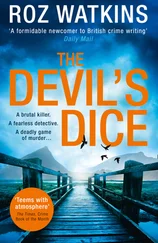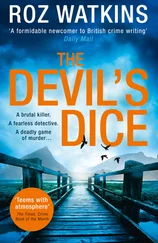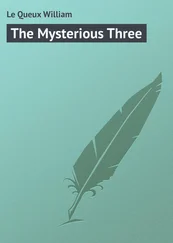William Le Queux - Devil's Dice
Здесь есть возможность читать онлайн «William Le Queux - Devil's Dice» — ознакомительный отрывок электронной книги совершенно бесплатно, а после прочтения отрывка купить полную версию. В некоторых случаях можно слушать аудио, скачать через торрент в формате fb2 и присутствует краткое содержание. Издательство: Иностранный паблик, Жанр: foreign_prose, на английском языке. Описание произведения, (предисловие) а так же отзывы посетителей доступны на портале библиотеки ЛибКат.
- Название:Devil's Dice
- Автор:
- Издательство:Иностранный паблик
- Жанр:
- Год:неизвестен
- ISBN:нет данных
- Рейтинг книги:4 / 5. Голосов: 1
-
Избранное:Добавить в избранное
- Отзывы:
-
Ваша оценка:
- 80
- 1
- 2
- 3
- 4
- 5
Devil's Dice: краткое содержание, описание и аннотация
Предлагаем к чтению аннотацию, описание, краткое содержание или предисловие (зависит от того, что написал сам автор книги «Devil's Dice»). Если вы не нашли необходимую информацию о книге — напишите в комментариях, мы постараемся отыскать её.
Devil's Dice — читать онлайн ознакомительный отрывок
Ниже представлен текст книги, разбитый по страницам. Система сохранения места последней прочитанной страницы, позволяет с удобством читать онлайн бесплатно книгу «Devil's Dice», без необходимости каждый раз заново искать на чём Вы остановились. Поставьте закладку, и сможете в любой момент перейти на страницу, на которой закончили чтение.
Интервал:
Закладка:
Did this strange individual fear to meet me face to face?
Though my mind was filled with memories of that fateful night when I had been joined in matrimony to my divinity, I nevertheless chatted with several women I knew, and at last found myself again with Dora, “Jack, lad,” being carried off by our energetic old host to be introduced to the buxom daughter of some Lancashire worthy.
Dora pulled a wry face and smiled, but we talked gayly together until the soldier-novelist returned. Soon afterwards, however, old Lady Stretton came up to us and carried off her daughter, while Jack shared my cab as far as his chambers, where we parted.
Chapter Seven
On Life’s Quicksands
At home I cast myself in my chair and threw myself into an ocean of memories. I did not switch on the light, but mused on, gazing into the darkness, now and then lit up by the ruddy flames as they shot forth from the grate and cast great quivering shadows, like dancing spectres, on the walls and ceiling. Ever and anon a momentary flash would hover about the antique silver ewer or glint along the old oak sideboard, which, like a vague dark mass, filled up an angle in the room, or play about the set of old china or the pair of antique vases on the mantelshelf. This prevailing gloom, penetrated by fitful gleams, was soothing after the glare and glitter of what had irreverently been termed the cotton-palace, and as the fickle light fell in spectral relief about the gloom-hidden furniture, I mused on in coldest pessimism.
As I sat thinking what I had lived through, scenes in many climes and pictures of various cities rose before my mind, but one face alone stood out boldly before me, the sweet countenance of the woman I had loved.
I recollected the strange events of that fateful night of grief and terror, and reflected upon the recognition between the Countess and the unknown man whom she had admitted was her enemy. How suddenly and completely he had disappeared! Yet it was apparent that he held some strange influence over Fyneshade’s wife, for she feared to tell me his name or disclose her secret. Even though he had brushed past me and his cold, glittering eyes had gazed into my face, he had again eluded me. The expression of triumph upon his dark countenance was still plainly before me, a look full of of portent and evil.
I met Dora several times, once riding in the Park, once at the theatre with Lady Stretton, and once in Park Lane with her lover. From her I learnt that the Countess had been very unwell ever since that evening at Thackwell’s, and had not been out. Her doctor had recommended complete rest for a week, and suggested that she should afterwards go to the Riviera for a change.
Was this extreme nervousness from which she was suffering the result of the unexpected encounter with the man she held in dread? I felt inclined to call at Eaton Square, but doubted whether, if she were ill, she would receive me.
One bright dry morning, about ten days later, I was strolling aimlessly along Regent Street with Jack Bethune, who, knowing that Dora would be out shopping, had come out to look for her. About half-way along the thoroughfare some unknown influence prompted me to halt before a photographer’s window and inspect a series of new pictures of celebrities, when suddenly my eye fell upon an object which, placed in the most prominent position in the centre of the window, caused me to utter a cry of surprise.
Enclosed in a heavy frame of oxidised silver was a beautifully-finished cabinet portrait of Sybil!
The frame, a double one, also contained the portrait of a young pleasant-faced man of about twenty-five, who wore his moustache carefully curled, and about whose features was a rather foreign expression. The picture of my dead love riveted my attention, and as I stood gazing at it with my face glued to the glass, Jack chaffed me, saying:
“What’s the matter, old chap? Who’s the beauty?” His flippant words annoyed me.
“A friend,” I snapped. “Wait for me. I’m going in to buy it.”
“On the stage, I suppose?” he hazarded. “Awfully good-looking, whoever she is.”
“No, she’s not on the stage,” I answered brusquely, leaving him and entering the shop.
At my request the frame was brought out of the window, and in response to my inquiries regarding it the manager referred to his books, an operation which occupied considerable time. Meanwhile Jack, who had found Dora, had rushed in, announced his intention of calling on me in the evening, and left.
At last the photographer’s manager came to me, ledger in hand, saying: “Both photographs were taken at the same time. I remember quite distinctly that the young lady accompanied the gentleman, and it was at her expense and special request that they were framed together and exhibited in our window. The prints were taken hurriedly because the gentleman was going abroad and wanted to take one with him.”
“What name did they give?”
“Henniker.”
“And the address?” I demanded breathlessly.
The photographer consulted his book closely, and replied: “The prints appear to have been sent to Miss Henniker, 79 Gloucester Square, Hyde Park.”
Upon my shirt cuff I scribbled the address, and having paid for both the portraits, was about to leave, congratulating myself that at last I had probably obtained a clue to the house to which I had been conducted, when it suddenly occurred to me to ask the date when the photographs were taken.
“They were taken on January 12th last,” he replied.
“Last year, you mean,” I said.
“No, the present year. This ledger was only commenced in January.”
“What?” I cried amazed. “Were these portraits actually taken only six weeks ago? Impossible! The lady has been dead fully three months.”
“The originals of the portraits gave us sittings here on the date I have mentioned,” he said, handing me the packet courteously, putting aside the frame, and leaving me in order to attend to another customer.
The announcement was incredible. It staggered belief. Emerging from the shop, I jumped into a cab and gave the man the address in Gloucester Square. Then, as we drove along, I took out the photograph of my well-beloved and examined it for a long time closely. Yes, there was no mistake about her identity. The same sweet, well-remembered face, with its clear, trusting eyes looked out upon me, the same half-sad expression that had so puzzled me. I raised the cold, polished card to my lips and reverently kissed it. Presently the cab drew up suddenly, and I found myself before a wide portico extending across the pavement to the curb, in front of a rather gloomy, solid-looking mansion. Alighting, I crossed to the door, and as I did so counted the steps. There were three, the same number that I remembered ascending on that eventful night I had raised my hand to ring the visitors’ bell when suddenly a voice behind me uttered my name. It sounded familiar, and I looked round hastily. As I turned, the Countess of Fyneshade, warmly clad in smart sealskin coat and neat seal toque trimmed with sable, confronted me. Standing upon the pavement beneath the wide gloomy portico, she was smiling amusedly at the sudden start I had given on hearing my name.
“I declare you’ve turned quite pale, Stuart,” she cried with that gay, irresponsible air and high-pitched voice habitual to her. “You gave such a jump when I spoke that one would think you had been detected in the act of committing a burglary, or some other crime equally dreadful.”
“I really beg your pardon,” I exclaimed quickly, descending the steps and raising my hat. “I confess I didn’t notice you.” Then, for the first time, I observed standing a few yards from her a slim, well-dressed young man in long dark overcoat and silk hat.
Читать дальшеИнтервал:
Закладка:
Похожие книги на «Devil's Dice»
Представляем Вашему вниманию похожие книги на «Devil's Dice» списком для выбора. Мы отобрали схожую по названию и смыслу литературу в надежде предоставить читателям больше вариантов отыскать новые, интересные, ещё непрочитанные произведения.
Обсуждение, отзывы о книге «Devil's Dice» и просто собственные мнения читателей. Оставьте ваши комментарии, напишите, что Вы думаете о произведении, его смысле или главных героях. Укажите что конкретно понравилось, а что нет, и почему Вы так считаете.












